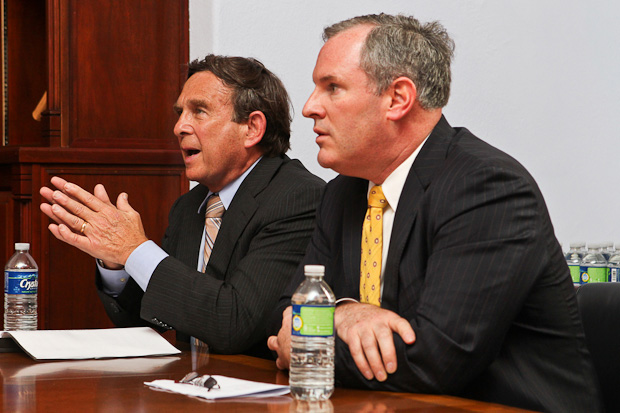Northeastern leads congressional briefing on cybersecurity

A Northeastern University team of experts led a congressional briefing in Washington on Wednesday that addressed the emerging vulnerabilities in cybersecurity that threaten consumers, industry and government at all levels.
As lawmakers are considering major cybersecurity legislation, the Northeastern delegation of faculty and industry experts joined U.S. Reps. William Keating (D-MA) and Michael McCaul (R-TX), chairman of the House Homeland Security Subcommittee on Oversight, Investigations and Management, as well as Rick “Ozzie” Nelson, director of the Center for Strategic and International Studies Homeland Security and Counterterrorism Program, to call for a robust, coordinated federal research and development program to improve the resilience of cybersecurity networks and infrastructure.
Citing numerous existing threats such as for-profit hacking schemes, malware aimed at weak mobile devices and attacks targeting major infrastructures that control key societal resources, professors Engin Kirda and William Robertson said the nature of the threats today are influenced by our daily dependency on the Internet making intruders more sophisticated than ever before.
“The Internet itself has become a critical infrastructure,” said Kirda, the Sy and Laurie Sternberg Associate Professor of Information Assurance in the College of Computer and Information Science and the Department of Electrical and Computer Engineering, and the director of Northeastern’s Institute for Information Assurance. “Research can play a big role in developing automated approaches to detect and mitigate attacks.”
Northeastern, he added, is well positioned to take a lead role in this area through collaborations in areas such as psychology, criminology and economics.
Kirda is the cofounder and codirector of the International Secure Systems Lab, a collaborative effort of European and U.S. researchers focused on computer security issues. Robertson, assistant professor in the College of Computer and Information Science and the Department of Electrical and Computer Engineering, is also part of this international lab.
Joining Kirda and Robertson in the discussion were Mel Bernstein, senior vice provost for research and graduate education, and former director of the Department of Homeland Security’s Office of University Programs, and Stephen Flynn, codirector of the university’s Kostas Research Institute for Homeland Security.
Flynn noted that America is more exposed than any other country in terms of physical infrastructure tied to IT, pointing to the country’s power grid, water and wastewater systems. He said the United States must supplement its prevention and defense efforts with a greater focus on resilience – a key area of focus at the Kostas Research Institute.
The White House has recently introduced legislation that seeks to bolster national cybersecurity protections to meet the challenges presented by evolving digital threats, though critics have pointed to the bill’s requirement that private computer systems meet certain security standards.
At the briefing, the Northeastern team pushed for the bill to incorporate the importance of including universities as partners in undertaking research that will lead to development of new cyberdefense technologies.
Keating said developing strategic partnerships between government, the private sector, business and academia is critical to overcoming cyberthreats. He said last week’s massive power outage in Boston to illustrate the kind of mayhem a potential attack could create. “We saw what happened with the power grid going out. You can only imagine a cyberattack having a far more reaching effect,” Keating said.
The briefing aligns with Northeastern’s commitment to meeting societal needs through use-inspired research addressing global challenges in security, health and sustainability. The university is developing innovative national cyberdefense research and solutions through work at the Kostas Research Institute, the ALERT (Awareness and Localization of Explosives-Related Threats) Center – a multi-university Department of Homeland Security Center of Excellence – and its Institute for Information Assurance.
Northeastern President Joseph E. Aoun was also recently appointed to the U.S. Department of Homeland Security’s Academic Advisory Council.
“This whole area, more than any I’ve seen, is an area of partnerships – private sector, corporate, defense – but one of the most important partners is academia, particularly in Massachusetts – and what it can bring to move these issues forward, give us an understanding of the threats, and work together to prevent some of the threats,” Keating said.




